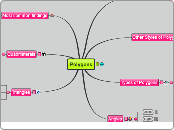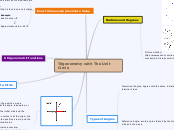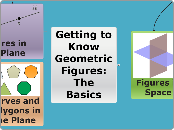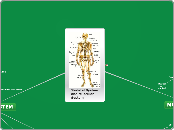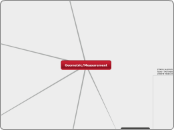Polygons
The goal of this mindmap on polygons is to inform people of how many different types of polygons there are. I want to show the differences and similarites of each type of polygon.
There are many different types of triangles. There are obtuse triangles, eqilarteral trianges, isoceles trianges, acute triangles, and many more.
Scalene
A scalene triangle have so equal sides and no equal angles.
Isosceles
An isosceles triangle has two equal sides and two equal angles.
Equilateral
An equilateral triangle has three equal sides and three equal angles. The angels are always 60 degrees.
Quadrilaterals have four sides, are coplanar, two sets of diagonals, and all of the sums of the interior angels equal 360 degrees.
Kites
A kite has two pairs of adjacent sides that are equal.
Trapezoids
A trapezoid has one pair of parallel sides.
Square
A square has two pairs of parallel sides, four right angles, and all four sides are equal.
It is also classified as a parallelogram and rectangle.
Rhombus
A rhombus is a parallelogram with four equal sides.
Rectangle
A rectangle has two pairs of opposite sides parallel and four right angles.
It is also classified as a pararllelogram.
Parallelogram
A parallelogram has two parallel pairs of opposite sides.
Most common findings
Quadrilaterals
Triangles
Angles
There are three different types of angles involved in making quadrilaterals and triangles. They are: actue, right, and obtuse.
Obtuse
An obtuse angle has an angel above 180 degress
Right
A right angle has an angle 90 degrees
Acute
All angles are less than 90 degrees.
Types of Polygons
Regular or Irregular
It is regular if all the sides and angles are equal to eachother. If the sides and angles differ then they are not regular, they are irregular.
Concave or Convex
A convex polygon has no angles pointing inwards. No internal angles are less than 180 degrees.
If the internal angles are greater than 180 degrees then it is concave.
A good way to remember it is that caves go inward and concave has the word cave it in.
Simple or Complex
A simple polygon has only one boundary and it doesn't intersect or cross over itself.
A complex polygon is the opposite because it intersects itself.
Other Styles of Polygons
If all of the sides are equal then it is a regular polygon as well as all of the angles are equal.
If they lengths of the sides differ and the angles differ then it is an irregular polygon.
Decagon
A decagon has ten sides and ten angles.
Nonagon
A nonagon has nine sides and nine angles.
Octagon
An octagon has eight sides and eight angles.
Heptagon
A heptagon has seven sides and seven angles.
Hexagon
A hexagon has six sides and six angles.
Pentagon
A pentagon has five sides and five angles.
What Makes a Polygon?
A polygon is a plane figure that is connected all the way around. It has a finite amount of straight line segments.
It is a two dimensional object.
If it is open in some way, for example two lines do not close or connect, it is not a polygon.
Sides
A way of classifying a polygon
Angels
A way of classifying polygons
